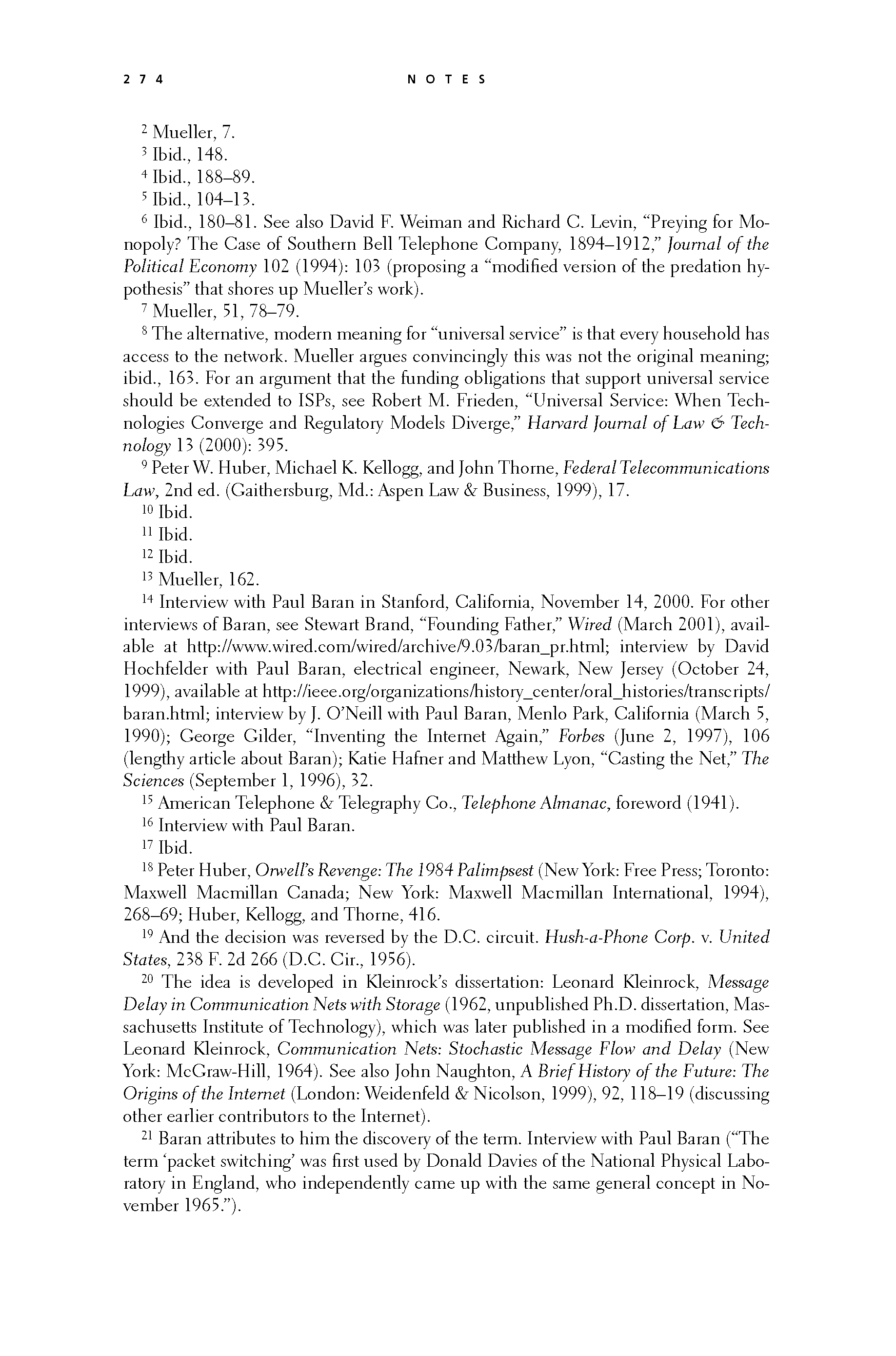 p273 _
-chap- _
toc-1 _
p274w _
toc-2 _
+chap+ _
p275
p273 _
-chap- _
toc-1 _
p274w _
toc-2 _
+chap+ _
p275
[3-2] Mueller, 7.
[3-3] Ibid., 148.
[3-4] Ibid., 188-189.
[3-5] Ibid., 104-113.
[3-6] Ibid., 180-181. See also David F. Weiman and Richard C. Levin, "Preying for Mo-
nopoly? The Case of Southern Bell Telephone Company, 1894-1912," _Journal_of_the_
_Political_Economy_ 102 (1994): 103 (proposing a "modified version of the predation hy-
pothesis" that shores up Mueller's work).
[3-7] Mueller, 51, 78-79.
[3-8] The alternative, modern meaning for "universal service" is that every household has
access to the network. Mueller argues convincingly this was not the original meaning;
ibid., 163. For an argument that the funding obligations that support universal service
should be extended to ISPs, see Robert M. Frieden, "Universal Service: When Tech-
nologies Converge and Regulatory Models Diverge," _Harvard_Journal_of_Law_&_Tech-_
_nology_ 13 (2000): 395.
[3-9] Peter W. Huber, Michael K. Kellogg, and John Thorne, _Federal_Telecommunications_
_Law,_ 2nd ed. (Gaithersburg, Md.: Aspen Law & Business, 1999), 17.
[3-10] Ibid.
[3-11] Ibid.
[3-12] Ibid.
[3-13] Mueller, 162.
[3-14] Interview with Paul Baran in Stanford, California, November 14, 2000. For other
interviews of Baran, see Stewart Brand, "Founding Father," _Wired_ (March 2001), avail-
able at http://www.wired.com/wired/archive/9.03/baran_pr.html; interview by David
Hochfelder with Paul Baran, electrical engineer, Newark, New Jersey (October 24,
1999), available at http://ieee.org/organizations/history_center/oral_histories/transcripts/
baran.html; interview by J. O'Neill with Paul Baran, Menlo Park, California (March 5,
1990); George Gilder, "Inventing the Internet Again," _Forbes_ (June 2, 1997), 106
(lengthy article about Baran); Katie Hafner and Matthew Lyon, "Casting the Net," _The_
_Sciences_ (September 1, 1996), 32.
[3-15] American Telephone & Telegraphy Co., _Telephone_Almanac,_ foreword (1941).
[3-16] Interview with Paul Baran.
[3-17] Ibid.
[3-18] Peter Huber, _Orwell's_Revenge:_The_1984_Palimpsest_ (New York: Free Press; Toronto:
Maxwell Macmillan Canada; New York: Maxwell Macmillan International, 1994),
268-269; Huber, Kellogg, and Thorne, 416.
[3-19] And the decision was reversed by the D.C. circuit. _Hush-a-Phone_Corp._ v. _United_
_States_, 238 F. 2d 266 (D.C. Cir., 1956).
[3-20] The idea is developed in Kleinrock's dissertation: Leonard Kleinrock, _Message_
_Delay_in_Communication_Nets_with_Storage_ (1962, unpublished Ph.D. dissertation, Mas-
sachusetts Institute of Technology), which was later published in a modified form. See
Leonard Kleinrock, _Communication_Nets:_Stochastic_Message_Flow_and_Delay_ (New
York: McGraw-Hill, 1964). See also John Naughton, _A_Brief_History_of_the_Future:_The_
_Origins_of_the_Internet_ (London: Weidenfeld & Nicolson, 1999), 92, 118-119 (discussing
other earlier contributors to the Internet).
[3-21] Baran attributes to him the discovery of the term. Interview with Paul Baran ("The
term 'packet switching' was first used by Donald Davies of the National Physical Labo-
ratory in England, who independently came up with the same general concept in No-
vember 1965.").
[[274]]
p273 _
-chap- _
toc-1 _
p274w _
toc-2 _
+chap+ _
p275